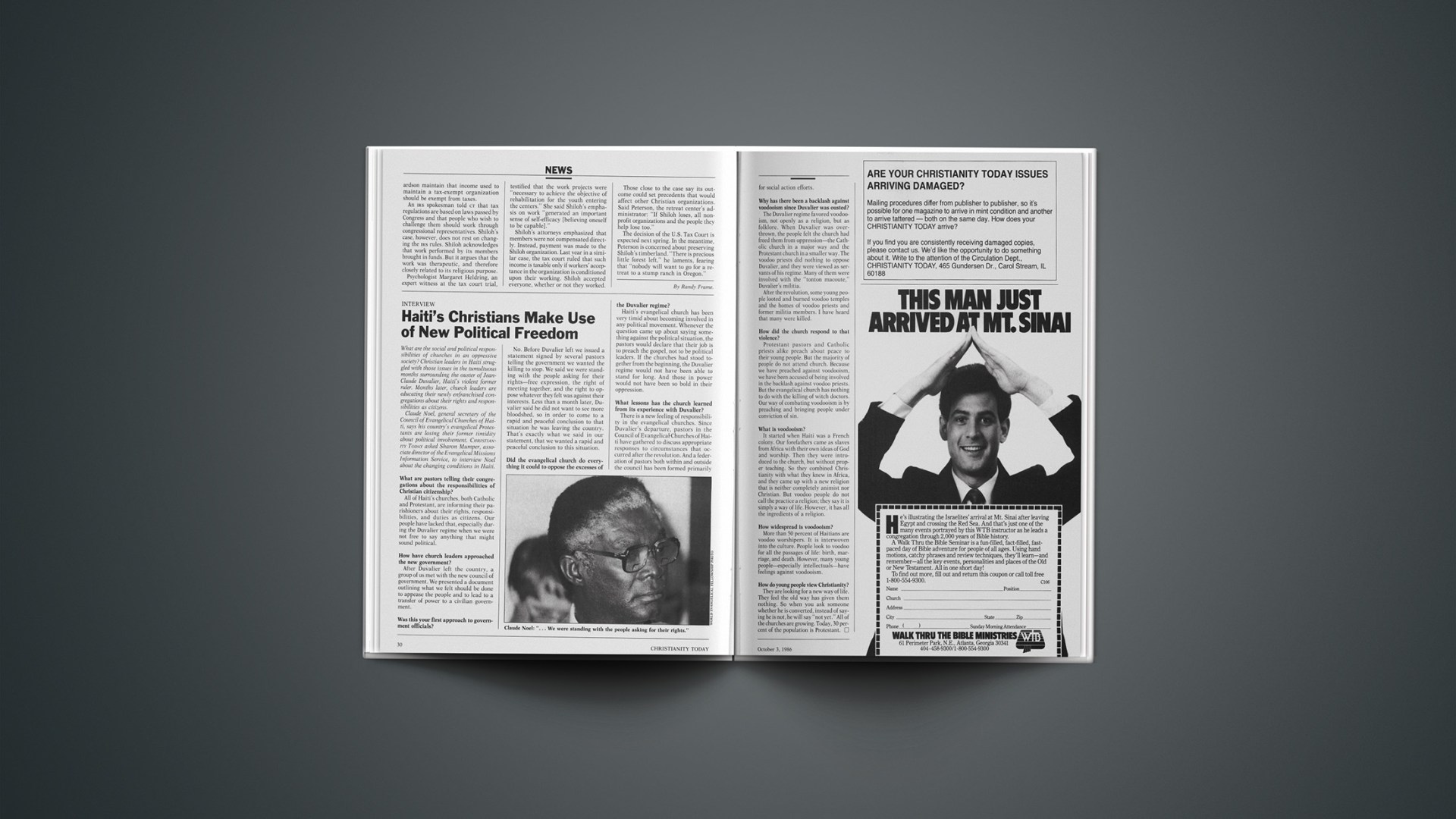What are the social and political responsibilities of churches in an oppressive society? Christian leaders in Haiti struggled with those issues in the tumultuous months surrounding the ouster of Jean-Claude Duvalier, Haiti’s violent former ruler. Months later, church leaders are educating their newly enfranchised congregations about their rights and responsibilities as citizens.
Claude Noel, general secretary of the Council of Evangelical Churches of Haiti, says his country’s evangelical Protestants are losing their former timidity about political involvement. CHRISTIANITY TODAY asked Sharon Mumper, associate director of the Evangelical Missions Information Service, to interview Noel about the changing conditions in Haiti.
What are pastors telling their congregations about the responsibilities of Christian citizenship?
All of Haiti’s churches, both Catholic and Protestant, are informing their parishioners about their rights, responsibilities, and duties as citizens. Our people have lacked that, especially during the Duvalier regime when we were not free to say anything that might sound political.
How have church leaders approached the new government?
After Duvalier left the country, a group of us met with the new council of government. We presented a document outlining what we felt should be done to appease the people and to lead to a transfer of power to a civilian government.
Was this your first approach to government officials?
No. Before Duvalier left we issued a statement signed by several pastors telling the government we wanted the killing to stop. We said we were standing with the people asking for their rights—free expression, the right of meeting together, and the right to oppose whatever they felt was against their interests. Less than a month later, Duvalier said he did not want to see more bloodshed, so in order to come to a rapid and peaceful conclusion to that situation he was leaving the country. That’s exactly what we said in our statement, that we wanted a rapid and peaceful conclusion to this situation.
Did the evangelical church do everything it could to oppose the excesses of the Duvalier regime?
Haiti’s evangelical church has been very timid about becoming involved in any political movement. Whenever the question came up about saying something against the political situation, the pastors would declare that their job is to preach the gospel, not to be political leaders. If the churches had stood together from the beginning, the Duvalier regime would not have been able to stand for long. And those in power would not have been so bold in their oppression.
What lessons has the church learned from its experience with Duvalier?
There is a new feeling of responsibility in the evangelical churches. Since Duvalier’s departure, pastors in the Council of Evangelical Churches of Haiti have gathered to discuss appropriate responses to circumstances that occurred after the revolution. And a federation of pastors both within and outside the council has been formed primarily for social action efforts.
Why has there been a backlash against voodooism since Duvalier was ousted?
The Duvalier regime favored voodooism, not openly as a religion, but as folklore. When Duvalier was overthrown, the people felt the church had freed them from oppression—the Catholic church in a major way and the Protestant church in a smaller way. The voodoo priests did nothing to oppose Duvalier, and they were viewed as servants of his regime. Many of them were involved with the “tonton macoute,” Duvalier’s militia.
After the revolution, some young people looted and burned voodoo temples and the homes of voodoo priests and former militia members. I have heard that many were killed.
How did the church respond to that violence?
Protestant pastors and Catholic priests alike preach about peace to their young people. But the majority of people do not attend church. Because we have preached against voodooism, we have been accused of being involved in the backlash against voodoo priests. But the evangelical church has nothing to do with the killing of witch doctors. Our way of combating voodooism is by preaching and bringing people under conviction of sin.
What is voodooism?
It started when Haiti was a French colony. Our forefathers came as slaves from Africa with their own ideas of God and worship. Then they were introduced to the church, but without proper teaching. So they combined Christianity with what they knew in Africa, and they came up with a new religion that is neither completely animist nor Christian. But voodoo people do not call the practice a religion; they say it is simply a way of life. However, it has all the ingredients of a religion.
How widespread is voodooism?
More than 50 percent of Haitians are voodoo worshipers. It is interwoven into the culture. People look to voodoo for all the passages of life: birth, marriage, and death. However, many young people—especially intellectuals—have feelings against voodooism.
How do young people view Christianity?
They are looking for a new way of life. They feel the old way has given them nothing. So when you ask someone whether he is converted, instead of saying he is not, he will say “not yet.” All of the churches are growing. Today, 30 percent of the population is Protestant.









